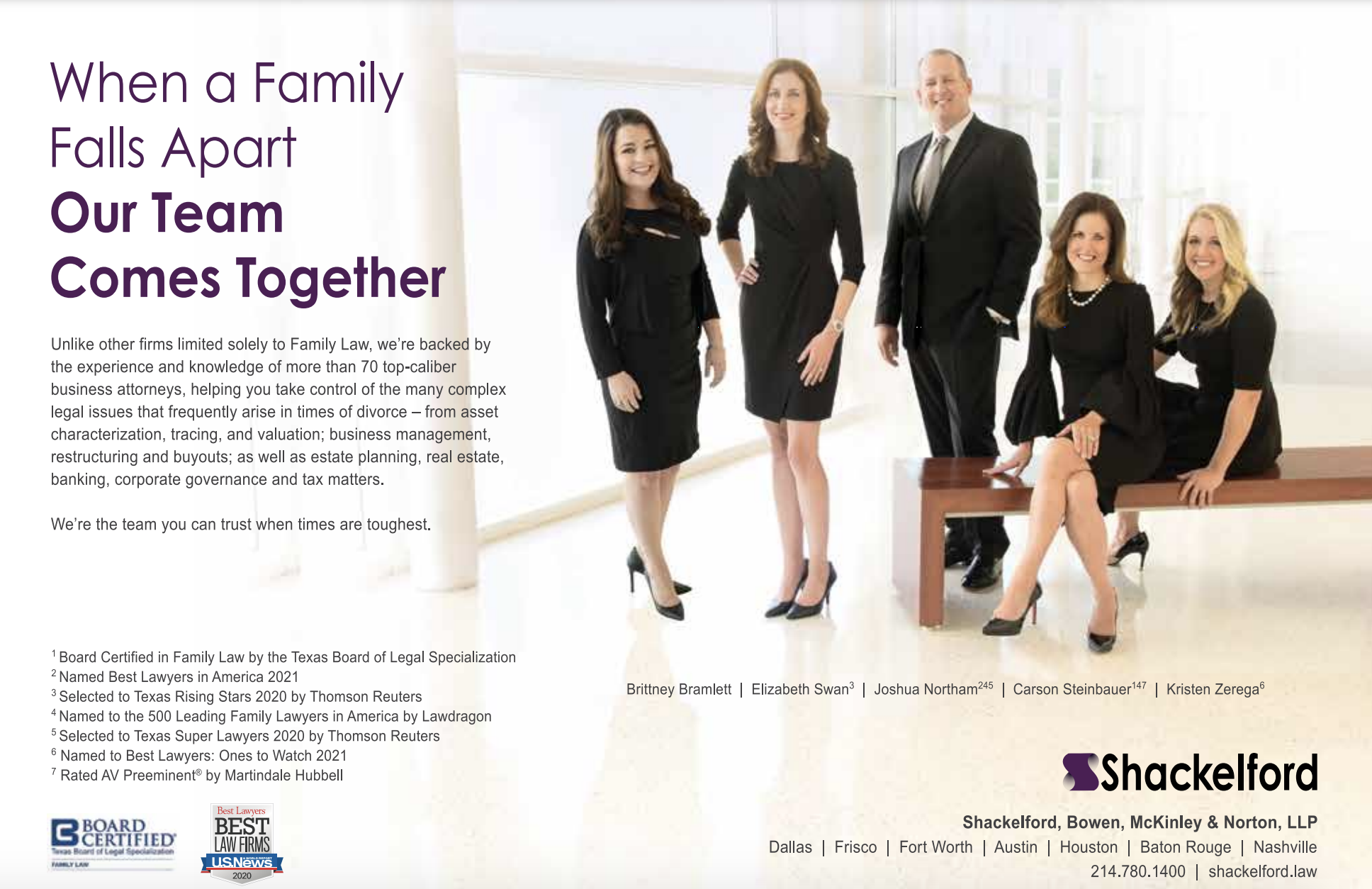By Carson Epes Steinbauer | October 2020 | Dallas Bar Association, Headnotes, 23
Sometimes better turns to worse, and what once was true may no longer be so. High-net-worth couples dealing with divorce face many complex challenges, including but not limited to the preservation, valuation, and division of ownership interests in privately held companies, and the fraudulent dissipation of assets.
There is no worse fraud than that committed by one spouse upon the other. In 1977, the Texas Supreme Court abolished the doctrine of inter-spousal immunity to the extent that it barred all claims between spouses for willful and intentional torts. Later, in 1998, the Supreme Court ruled that the fraudulent dissipation of community assets by a spouse during marriage is not an independent tort or cause of action from which damages can be recovered. Rather, a fraudulent transfer of marital assets may be presented to the factfinder by the injured spouse for consideration when seeking a disproportionate division of the community estate. The disproportionate division in favor of one spouse over the other compensates for the community property wrongfully expended or wasted by the spouse who committed the fraud.
While fraud in the civil arena allows for economic and exemplary damages as set forth in the Texas Civil Practice and Remedies Code, fraud on the community in a marriage is an entirely separate animal, the legal remedies of which are specifically outlined in Section 7.009 of the Texas Family Code. If the factfinder finds that a spouse committed actual or constructive fraud on the community, then the Court shall reconstitute the total community estate by determining the value of that portion of the estate that was depleted and recalculating the entire estate. Once the community estate has been reconstituted, the court is tasked with making a just and right division of the estate. In making a just and right division, the court has several legal and equitable remedies that it may consider. These remedies include awarding the wronged spouse a disproportionate division of the community estate or appropriate share of the community estate remaining after the actual or constructive fraud on the community; awarding a money judgment in favor of the wronged spouse against the spouse who committed the actual or constructive fraud on the community; or awarding to the wronged spouse both a money judgment and an appropriate share of the community estate. Unlike civil fraud, fraud on the community does not allow for recovery of damages and the remedies in the Family Code are exclusive to a spouse in a divorce.
Many times, a third party is in part responsible for fraud on a spouse during marriage. For example, a spouse may have secretly transferred real or personal community property out of the marital estate to a relative or a paramour to the detriment of the innocent spouse. In these circumstances, it may be appropriate to join the third party in the case for fraud, conspiracy, and conversion. Once again, independent tort damages are not recoverable against the third party in this instance; rather, the relief sought in the third-party action is the recovery of the community property fraudulently transferred out of the estate. In lieu of damages calculated for purposes of reconstituting the marital estate, a court may impose a constructive trust to recover the specific property wrongfully transferred out of the community.
Notably, fraud on the community is not subject to the traditional statute of limitations that applies to civil fraud claims. Because a claim for fraud on the community must be litigated as part of a just and right division in a divorce, it follows that a fraud claim in the context of a divorce is not ripe until the divorce is filed. Similarly, when fraud is alleged defensively in a divorce, such as when a spouse claims that he or she was fraudulently induced to sign a postnuptial agreement, Texas courts have held that the statute of limitations does not apply to defeat liability on an obligation induced by fraud.
Other times, a deceiving spouse may waste assets or intentionally run up debt, with the intent to deplete the value of the community estate prior to division in a divorce. This is sometimes true when a spouse has exclusive control of small business interests. The fraudulent spouse may transfer stock to a third party or take on extraordinary business debt to devalue the business with the intent to harm the other spouse and reduce that other spouse’s share of the estate. In this instance, the innocent spouse may again turn to the Texas Family Code and seek the appointment of a receiver for the preservation and protection of the parties’ property. The appointment of a receiver in a divorce is not subject to the stringent requirements otherwise set out in the Texas Civil Practice and Remedies Code, which requires a showing that property is in danger of being lost, removed, or materially injured. Rather, a spouse must only show that a receiver is necessary to preserve and protect property owned by the parties in the divorce.
Identifying and dealing with these and other complex issues in a contentious divorce is not for the faint of heart. When fraud is suspected and valuable assets are at stake, hire an experienced family lawyer to best protect a spouse’s financial interests in a divorce. HN

Carson Epes Steinbauer is a Partner with Shackelford, Bowen, McKinley & Norton, LLP and is Board Certified in Family Law. She can be reached at csteinbauer@shackelford.law.





